The HP S700 And S700 Pro SSD Review
by Billy Tallis on September 7, 2017 9:00 AM ESTAnandTech Storage Bench - The Destroyer
The Destroyer is an extremely long test replicating the access patterns of very IO-intensive desktop usage. A detailed breakdown can be found in this article. Like real-world usage, the drives do get the occasional break that allows for some background garbage collection and flushing caches, but those idle times are limited to 25ms so that it doesn't take all week to run the test. These AnandTech Storage Bench (ATSB) tests do not involve running the actual applications that generated the workloads, so the scores are relatively insensitive to changes in CPU performance and RAM from our new testbed, but the jump to a newer version of Windows and the newer storage drivers can have an impact.
We quantify performance on this test by reporting the drive's average data throughput, the average latency of the I/O operations, and the total energy used by the drive over the course of the test.
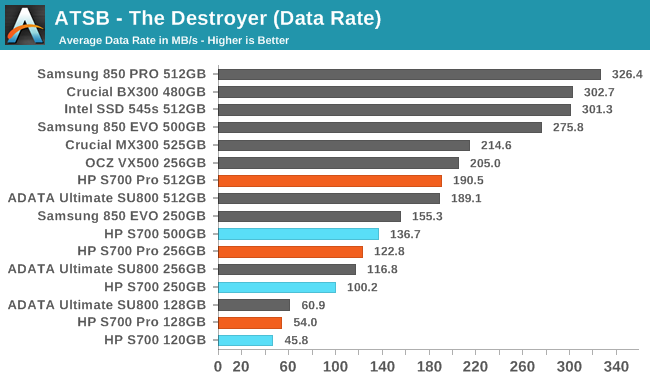
The average data rates of the S700 Pros on The Destroyer are slightly faster than the ATATA SU800 except at the 128GB capacity. The S700's disadvantage relative to the S700 Pro is more pronounced at higher capacities, growing from a 15% gap at the 120GB/128GB capacity range to almost 30% between the 500GB S700 and 512GB S700 Pro.
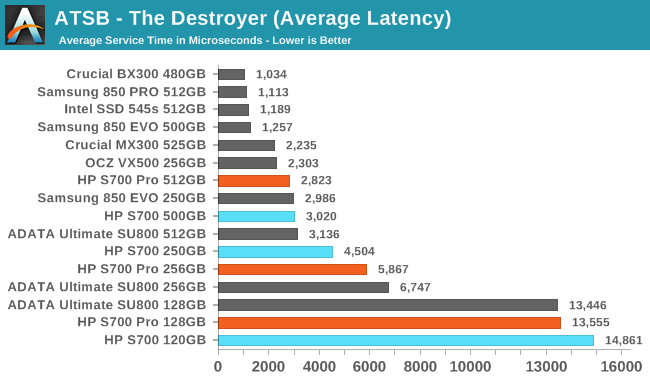
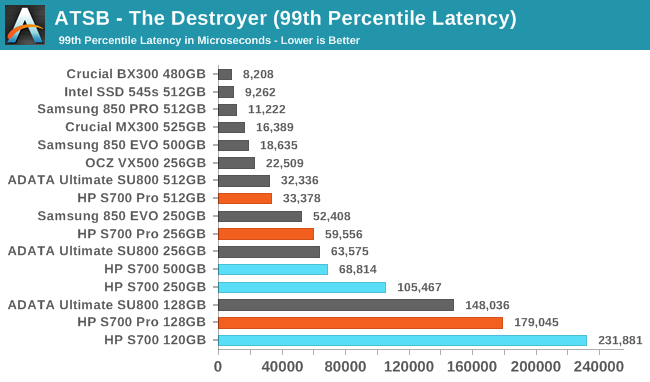
The 250GB S700 surprises with a lower average latency than the 256GB S700 Pro, and at this capacity point and the 500GB/512GB capacity point both HP drives score better than the ADATA SU800. The 99th percentile latency scores aren't as good, with the S700 coming in last place at every capacity point and the S700 Pro only beating the ADATA SU800 in the 256GB capacity.
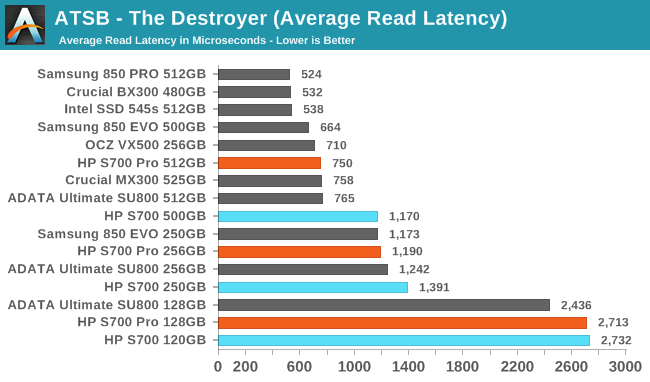
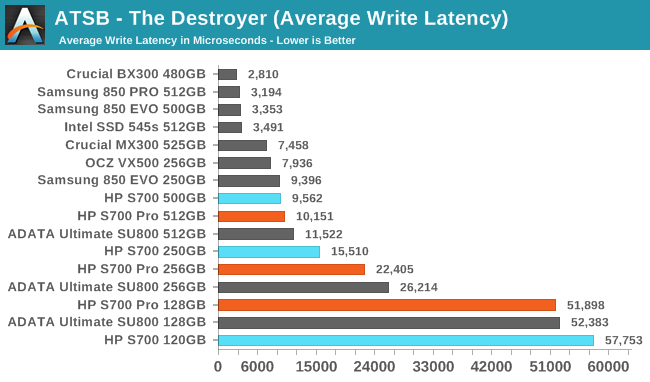
The average read latencies of the HP S700s are almost tied with the S700 Pro at the smallest capacity configuration, but the larger drives show a substantial gap. Average write latencies for the S700 are actually better than the S700 Pro and the ADATA SU800 except for the 120GB capacity.
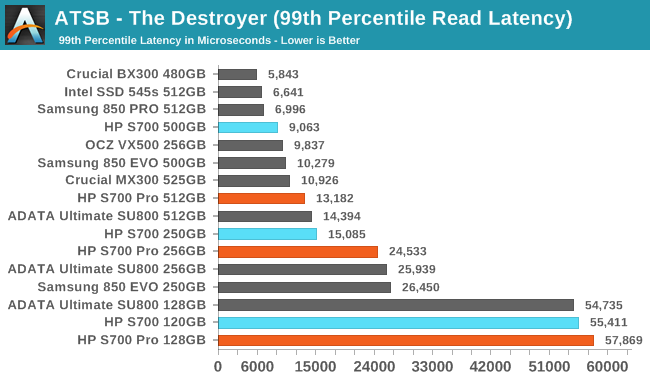
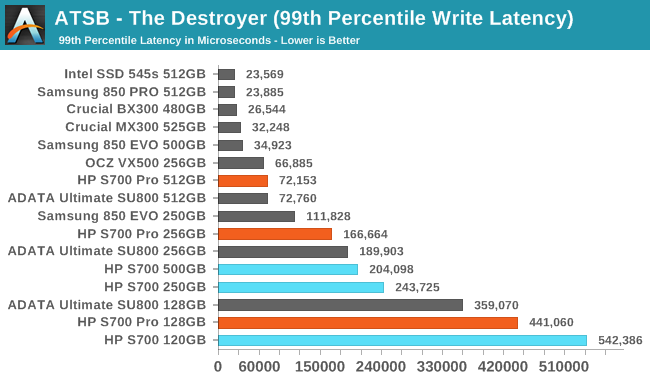
The HP S700 does not have a particular problem with garbage collection getting in the way of read operations as its 99th percentile read latency scores are better than the S700 Pro's scores and are reasonable even when compared to mid-range SATA drives and even drives using MLC. The 99th percentile write latency scores are poor for both the S700 and S700 Pro, but the ADATA SU800 is no better except for its 128GB capacity.
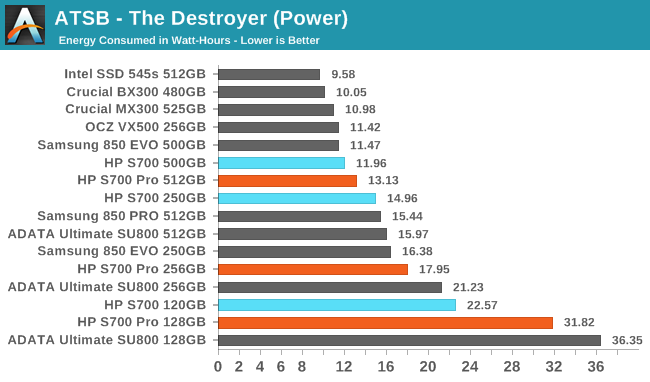
The DRAMless HP S700 is more energy-efficient on The Destroyer than the faster HP S700 Pro, and both beat the ADATA SU800. All of these drives obey the usual pattern of higher capacities offering better efficiency under load thanks to their higher performance being more than enough to offset higher overall power levels.










54 Comments
View All Comments
ddriver - Thursday, September 7, 2017 - link
Why is it "Pro"? Performance - nope, endurance - nope, warranty - nope, sounds better - nailed it.HP's brand new Pro bested by Samsung's ancient Evo...
MajGenRelativity - Thursday, September 7, 2017 - link
It's better than the 700 non-Pro, so it warrants that in relation to its other counterpart.mooninite - Thursday, September 7, 2017 - link
You nailed it. Unfortunately HP will sell units because 1) they'll ship them in their own systems they sell and 2) they have blindly loyal customers.MajGenRelativity - Thursday, September 7, 2017 - link
I assume that's why HP went to the trouble of making an SSD? :Psyxbit - Thursday, September 7, 2017 - link
Making? They're not making anything here. They're repackaging another company's engineering efforts.Samus - Thursday, September 7, 2017 - link
The only blindly loyal customers out there are Lenovo's. On the whole, HP's mid-high end systems are the best on the market. Both companies...all companies, make crap at the low end. The business and professional market are where HP just destroys Lenovo is serviceability, reliability, and support. Lenovo simply wins on price. That's why people love them. Because they are cheap. And orange.sonny73n - Friday, September 8, 2017 - link
You sound spiteful. Are you hurt because Lenovo took over as the world's top ranking PC manufacturer after Q2 2013? HP has only gone downhill after that because all HP products have been made in China since who knows when.There's no company I dislike more than a domestic one with products being made overseas then shipped back and sold at home.
barleyguy - Friday, September 8, 2017 - link
You can't have your cake and eat it too. The reality is that western labor costs about 10 times as much as Chinese labor, and it's a price competitive market. If an HP laptop was built domestically, it would cost hundreds of dollars more, and most people would buy the cheaper one built in China.You either get cheap electronics or you get domestic manufacturing. At this point in time, you can't have both.
FunBunny2 - Friday, September 8, 2017 - link
-- The reality is that western labor costs about 10 times as much as Chinese laborthat made a bunch of difference years ago, but if you look at the FRED data, labor has become a vanishingly small part of production cost. if you're relying on bleeding labor to make money, you won't make much money.
Alexvrb - Sunday, September 10, 2017 - link
Exactly. Also there are lots of regions of the US where labor is cheap (rural low cost of living parts of RTW states for example). I suspect other factors such as taxes and regulation drive them to move production overseas more so than the hourly rate of workers.